|
|
|
Sort Order |
|
|
|
Items / Page
|
|
|
|
|
|
|
| Srl | Item |
| 1 |
ID:
175154
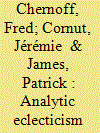

|
|
|
|
|
| Summary/Abstract |
Some scholars in International Relations and comparative politics continue to debate how to obtain the strongest explanatory theory whereas others hold that each approach should be treated as its own area of research. Both of these groups tend to agree that factors from across paradigms cannot be coherently combined with each other. On the contrary, Sil and Katzenstein have argued for analytic eclecticism in scholarship, which would not treat research traditions or paradigms as strict limitations on theory construction. Inspired by pragmatism, they have made a compelling case that considerations of usefulness and knowledge cumulation are more important than paradigmatic fidelity. This forum examines analytic eclecticism from the points of view of neo-empiricism, feminism, and interpretive constructivism, followed by a reply by Sil. A decade has passed since the publication of Sil and Katzenstein’s Beyond Paradigms, so it seems appropriate to reflect upon the strengths and weaknesses of analytic eclecticism.
|
|
|
|
|
|
|
|
|
|
|
|
|
|
|
|
| 2 |
ID:
154664
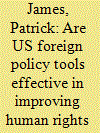

|
|
|
|
|
| Summary/Abstract |
This is the first empirical study to evaluate, in combination, the relative impact of the US’s four major foreign policy tools (i.e., military intervention, military assistance, economic sanctions, and economic assistance) on human rights conditions abroad. This study presents a Hegemonic Intervention Hypothesis, which cautions against US action to promote human rights, and a Coercion Hypothesis, which assesses punitive actions as likely to be more harmful than acts of assistance. Relying on a dataset of 144 countries for the years 1975–2005, this study finds that, contrary to Washington’s stated desire to promote human rights, all forms of US foreign policy intervention are either neutral in effect or linked to increases in the level of state repression.
|
|
|
|
|
|
|
|
|
|
|
|
|
|
|
|
| 3 |
ID:
141094


|
|
|
|
|
| Summary/Abstract |
Debates about whether China's rise poses a threat or an opportunity for Taiwan have settled into a realist assumption that Beijing will continue to upset the balance of power and a liberal approach that believes the benefits of economic interdependence are leading to greater gains. Missing from this debate is a nuanced consideration of how Taiwan's policy elites view themselves and their position in cross-Strait relations. Taiwan's decision makers' views are deeply affected by, and interact with, factors and institutions on and beyond the island. This article offers a model of political processes – the staying power of the status quo and order of movement – as a possible route towards an explanation for Taiwan's position on cross-Strait negotiations. The conclusion is that the status quo position – de facto but not de jure independence – is becoming more entrenched with time. Taiwan's colours of partisanship, Blue and Green, are blending into Aquamarine.
|
|
|
|
|
|
|
|
|
|
|
|
|
|
|
|
| 4 |
ID:
080833


|
|
|
|
|
| Publication |
2008.
|
| Summary/Abstract |
Looking beyond the democratic/Kantian peace argument that highlights the pacifying effect of regime type on international conflict, this study explores additional, potentially important domestic factors that may influence conflict - most notably, civil-military structure, such as degree of civil versus military control and military manpower system. It also looks into the effects of political communication in terms of diplomatic channels and open media. On the basis of logistic regression analysis for 120 countries during the period from 1950 to 1992, the authors report that strong military influence is more likely to lead to the onset of militarized interstate disputes, wars, and international crises while the presence of conscripted soldiers, diplomatic activities, and open media makes that less likely. These results hold up in the presence of the three Kantian peace variables (i.e. democracy, economic interdependence, and joint membership in international organizations) and other control variables that are standards within contemporary research designs. Thus, the authors conclude that the four factors are important complements to understanding the impact of domestic traits on interstate conflict beyond the conventional regime-type explanation of the democratic/Kantian peace
|
|
|
|
|
|
|
|
|
|
|
|
|
|
|
|
| 5 |
ID:
148155
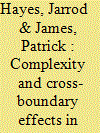

|
|
|
|
|
| Summary/Abstract |
If one trend characterizes the study of foreign and security policy over the past several decades, it may be the search for concepts that assist in addressing the complexity of global politics.2 We embrace that complexity and reimagine security as a social phenomenon that interweaves between social collectives, bleeding across boundaries and tying collectivities together as they seek to reconcile different systems of security meaning-making. At its core, security is a socially constructed system for making sense of danger and threat (Buzan et al. 1998). Thinking about security as a phenomenon of linked social constructions opens the field of inquiry up to a massive amount of complexity and interactivity. We offer two concepts as a possible basis for thinking about the ways in which security systems interact with and influence the operation of other security systems: multidirectionality and anticipated reaction.
|
|
|
|
|
|
|
|
|
|
|
|
|
|
|
|
| 6 |
ID:
037248


|
|
|
|
|
| Publication |
Boulder, Westview Press, 1986.
|
| Description |
x, 160p.
|
| Standard Number |
0813372119
|
|
|
|
|
|
|
|
|
|
|
|
Copies: C:1/I:0,R:0,Q:0
Circulation
| Accession# | Call# | Current Location | Status | Policy | Location |
| 027342 | 327.16/BRE 027342 | Main | On Shelf | General | |
|
|
|
|
| 7 |
ID:
024495


|
|
|
|
|
| Publication |
Kingston, McGill-Queen University Press, 1988.
|
| Description |
192p.
|
| Standard Number |
0773505741
|
|
|
|
|
|
|
|
|
|
|
|
Copies: C:1/I:0,R:0,Q:0
Circulation
| Accession# | Call# | Current Location | Status | Policy | Location |
| 031548 | 355.027/JAM 031548 | Main | On Shelf | General | |
|
|
|
|
| 8 |
ID:
137821
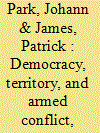

|
|
|
|
|
| Summary/Abstract |
Democracy and territory are two of the most important factors that affect conflict and war. Yet no research design looks directly at a possible interaction between these two variables to influence occurrence of armed conflict. This study seeks to answer the following question: “How do two democracies behave when a contentious issue such as territory arises as the source of conflict between them?” Results based on Militarized Interstate Dispute data from 1920 to 1996 produce the conclusion that the pacifying effect of democracy stands up for both territorial dyads and non-territorial ones in spite of the imperatives toward militarization created by territorial conflict. However, territory of high salience still appears to increase the likelihood of armed conflict between two democracies.
|
|
|
|
|
|
|
|
|
|
|
|
|
|
|
|
| 9 |
ID:
092260


|
|
|
|
|
| Publication |
2009.
|
| Summary/Abstract |
Much has been written on the triangular, and increasingly high-profile, China-Taiwan-US relations. However, scholars have yet to apply Diversionary Theory to the China-Taiwan dyad. DT argues that leaders may resort to international conflict when domestic political and economic situations become troublesome, aiming at directing public attention away from problems at home. While creation of explicit military conflict in the Taiwan Strait by Taipei is deemed quite unlikely, more subtle processes of diversion might be expected instead. This article applies a variant on DT to assess whether leaders in Taipei have used rhetoric about Taiwan independence or unification as a distraction from domestic problems during the years leading up to Taiwan's 2004 presidential election. We find that, as the president's approval sinks, pro-independence rhetoric becomes more likely. Overall, the results of this study confirm extension of DT to the case of Taiwan and encourage further research applied to middle powers.
|
|
|
|
|
|
|
|
|
|
|
|
|
|
|
|
| 10 |
ID:
065716
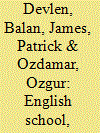

|
|
|
| 11 |
ID:
102761
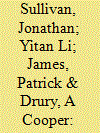

|
|
|
| 12 |
ID:
089113
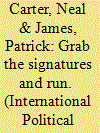

|
|
|
| 13 |
ID:
089112


|
|
|
| 14 |
ID:
054422
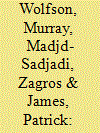

|
|
|
| 15 |
ID:
084000
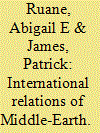

|
|
|
|
|
| Publication |
2008.
|
| Summary/Abstract |
This article demonstrates how by using J.R.R. Tolkien's Lord of the Rings (LOTR) as a text in the classroom instructors can relay the international relations (IR) "Great Debates" and feminist "waves" to students through the framework of "where you stand depends on where you sit." It overviews how J.R.R. Tolkien's acclaimed trilogy is relevant to learning about IR and then presents a number of "cuts" into using LOTR to inform IR teaching of both problem solving and critical theory. It begins by parsing the three "Great Debates" of IR theory and three "waves" of feminist theory in terms of different worldviews by relating them to characters from the trilogy. Next, the paper suggests that a critical evaluation of this analysis conveys that concerns, goals, and understandings of problems and insecurities are influenced (although not determined) by context, such as gender, race, class, sexuality, and postcolonial position. It concludes by suggesting that further use of popular culture and the humanities can help IR teaching both illustrate and critically reflect on IR scholarship.
|
|
|
|
|
|
|
|
|
|
|
|
|
|
|
|
| 16 |
ID:
087338


|
|
|
|
|
| Publication |
2009.
|
| Summary/Abstract |
The purpose of this review is to identify a framework for understanding the internationalization of ethnic conflict. We examine three approaches that purport to explain escalation-namely extension, interaction, and transformation-and emphasize the fact that each theory by itself lacks full explanatory power. Synthesis that focuses on factors from state and society, which shape the decision to become involved in ethnic strife is essential. Examination of the preceding factors reveals that institutional configurations and ethnic composition indeed do limit future options available to states and influence the distribution of capabilities among leaders of groups. The main conclusion of this essay is that ethnic diversity in a society and high constraint on state action are optimal conditions for overcoming insecurity.
|
|
|
|
|
|
|
|
|
|
|
|
|
|
|
|
| 17 |
ID:
100960
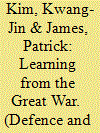

|
|
|
|
|
| Publication |
2010.
|
| Summary/Abstract |
This paper explores the effects of dyadic democracy on both the occurrence and level of militarized disputes, with an emphasis on longitudinal tendencies and degrees of violence. We argue that experience with total war, namely, the First World War, induced democratic constraints on conflictual foreign policies via significant change in military manpower systems. Experience with total war led democratic governments to recognize each other's sensitivity to public concerns about the burdens imposed by conscription. Thus, democratic peace in the modern era can be traced to (1) total war experience for 'old' democracies; and (2) the level of violence in foreign policies exceeding a threshold that induces public concerns about the burden of conscription. Empirical testing based on the Militarized Interstate Disputes (MID) data set shows a significantly different effect for democratic dyads on the onset of militarized disputes before and after the First World War. Democratic dyads, however, do not reduce the likelihood of disputes in cases with a low level of violence regardless of the era in question. This implies that conflict-averse behavior between democracies is a product of learning from the experience of total war that leads to greater government awareness of public concern about more intense foreign policy actions.
|
|
|
|
|
|
|
|
|
|
|
|
|
|
|
|
| 18 |
ID:
103661
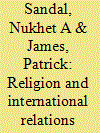

|
|
|
|
|
| Publication |
2011.
|
| Summary/Abstract |
Until the end of the Cold War, it is not an exaggeration to say that only a few theorists of International Relations (IR) or policy-makers engaged in either substantial investigation or articulation of the links between cultural variables like religion and ethnicity on one hand and international affairs on the other. In our article, we argue that this pattern does not do justice to the nature of mainstream IR theories. Although studies are accumulating, how (or whether) religion as a variable can be integrated into mainstream IR thinking still remains in question. We look at three main traditions in IR theory - classical realism, structural realism and neoliberalism - to see how religion can contribute to our understanding of international affairs within those frameworks. We claim that, without stretching the limits of theories or disturbing their intellectual coherence, possibilities for two-way interactions between the frameworks and identity-related variables like religion can be identified.
|
|
|
|
|
|
|
|
|
|
|
|
|
|
|
|
| 19 |
ID:
141189


|
|
|
|
|
| Summary/Abstract |
Idealized independent media function as “watchdogs.” Indeed, human rights nongovernmental organizations have argued that media freedom will improve human rights. This makes sense intuitively, yet recent formal and empirical studies show that the effect of independent media varies across regime types. We explore the relationship among media, government, and citizen protest movements and employ a game-theoretic model to investigate how the equilibria vary depending on regime type and media independence. In terms of equilibrium, we find that media watchdogging is most active in autocracies (and not in democracies), especially when the government’s perceived capability to repress public protest is declining. Uncertainty about the government’s ability to repress plays a central role in accounting for the manifestation of media watchdogging in conjunction with public protest. Illustrations from Tunisia and North Korea are provided to highlight equilibria derived from the formal model that vary as a product of perceptions about the government’s ability to repress.
|
|
|
|
|
|
|
|
|
|
|
|
|
|
|
|
| 20 |
ID:
108685
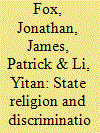

|
|
|
|
|
| Publication |
2009.
|
| Summary/Abstract |
We address two issues neglected in cross-national ethnic conflict literature: the role of state religious exclusivity (SRE) in ethnic conflict and the causes of discrimination against ethnic minorities. We use data from the Minorities at Risk (MAR), Polity, and Religion and State (RAS) datasets to assess whether SRE influences the extent of discrimination and repression against ethnic minorities between 1990 and 2002. The results show that SRE is strongly and significantly associated with discrimination and repression against ethnic minorities. This is true both of ethno-religious minorities and ethnic minorities who are not religiously distinct from the majority group in the state.
|
|
|
|
|
|
|
|
|
|
|
|
|
|
|
|
|
|
|
|
|